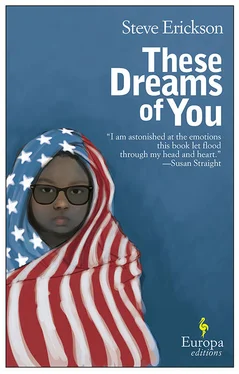“I’m sorry,” Zan sputtered, horrified, “I thought you were with Parker.”
“Thank you VERY much for RUINING MY DAY, parents !” she declaimed, and months later the girl still hasn’t forgotten. Wherever they are or whatever they’re doing, out of nowhere, in the middle of any conversation or some rare silence, she mutters, “You left me in the car,” and who knows what scenario she considered in those moments strapped in her booster seat, having been left at an orphanage by her grandmother when she was two years old, having been left by her mother at the grandmother’s door when she was four months old: Did she wonder, Is this where I wait for someone else to come take me? and as she waited, did she watch for that hawaiian tsunami to come roaring down the driveway?
Not until Viv got to Ethiopia to bring Sheba home did she learn the truth about the girl’s first two years. The second morning in Addis Ababa, she went to meet a woman who had been identified by the adoption agency as a kind of caretaker; the woman was in her mid-sixties but seemed older. She had blue cataract eyes and was dressed in traditional clothes, and accompanied by her grown daughter. When the women began to cry, Viv learned that the older woman was Sheba’s paternal grandmother and the younger was Sheba’s aunt, the sister of Sheba’s father.
The grandmother spoke Amharic but the aunt spoke English. The aunt explained to Viv that — notwithstanding the adoption agency’s account, which always was vague — Sheba was raised by the grandmother. Supporting her family by making moonshine tej, the local honeywine, after her land was seized in the Eighties by the communist Derg that followed the fall of Haile Selassie, the old woman eventually was no longer able physically or financially to care for Sheba, who at the age of four months was left on the doorstep by the girl’s mother, an unwed Muslim.
When Viv first met Sheba, the girl vacillated between a psychic desolation almost impossible to fully accommodate and the insubordination that meant survival for someone so young needing so much. Then, just when Viv thought she was turning a corner with the girl, Sheba wanted nothing to do with her, an abstinence that lasted for days. What have I done , Viv wrote to Zan, what have I gotten us into. But the girl always followed her new mother with her eyes, and in the middle of the night, as the sax line of a song drifted through the open window of the hotel room, Viv felt a small finger constantly moving along the outline of her face to make certain she was there. Sheba grabbed Viv’s face in her hands and pulled it close as if to share the same breath.
Sheba’s father disputed his paternity. A former veteran of the Ethiopian Air Force and one of the countless wars that the country fought with the countries around it — or maybe it always was the same war — he insisted that wounds he suffered in battle made it impossible for him to be Sheba’s father.
“The old war-wound excuse!” Zan said in disbelief when he heard it. The father had no job to support the child. That he was Christian when the mother was Muslim only made the circumstances more difficult. But the grandmother acknowledged the baby girl’s DNA even as the father wouldn’t, and only after two years when she became more infirmed did she take Sheba to the local orphanage, where for two weeks the little girl waited vainly in the yard for her grandmother to return.
Relatively quickly, Sheba was assigned by the adoption agency to Viv and Zan, who had filed their papers some months before. Now the couple is amused by people who believe prospective parents saunter through orphanages choosing a child like someone picks a kitten at the animal shelter. The adoption process, involving medical tests, hours of online schooling, an impossible paper chase of countless forms and documents, and the scheduling of African court dates, was followed by Viv’s twenty-four-hour hejira to Addis Ababa by way of Chicago, London, Frankfurt and Cairo to get the girl.
I chose you , were the grandmother’s parting words before Viv left Ethiopia to return with Sheba to Los Angeles, I chose you through God to be her mother and only in the final moments did the girl’s father bring himself to admit that Sheba was his daughter, as though anyone looking at the two would have any doubt.
Given Viv, it’s not hard to believe she’s been chosen. Out of several billion women Sheba’s grandmother somehow plucked the truest heart, Viv who once wanted to bring to the house all the old homeless men of the canyon for a Christmas shower, Viv who will give away to the destitute whatever little money the family has left if Zan doesn’t stop her. Viv who would be field marshal of the world’s needing and needed as surely as she field-marshals the family priorities, when the family isn’t chafing at her command. “I’m a flawed human being,” she moans plaintively to Zan.
Fifteen years ago, before either of the children, a photographic series on church stained-glass windows led Viv to her great artistic endeavor. These were steel-framed recreations of the windows in the wings of butterflies that had died after their full butterfly-lives of several weeks; as Viv would have it, the juxtaposition of wing and steel is a metaphor for life, but Zan knows it’s a metaphor for the woman, the fragile and gritty joined in all five-feet-two of her. The pieces attracted attention as evidenced by their exhibition in a number of galleries and acceptance into the permanent collections of two Southland museums, but most prominently by their plagiarism: Over the past several years Viv has found herself at the center of one of the art world’s most notorious scandales , when both the idea and medium of the butterfly stained-glass windows were stolen by the world’s most successful artist — a man as well known for cavalierly “appropriating” other people’s ideas as for making tens of millions of dollars dipping elephants in plastic. While numerous people have pointed out the grounds for legal action, it sums up the Nordhocs’ lives emotionally as well as financially that they have nearly as little psychological wherewithal as they do financial resources to sue the bastard.
Rather Viv has poured her heart into Sheba’s adoption, which is less glamorous than television images of movie stars jetting in to scoop up African children. Months after the girl comes to live with them, Zan and Viv realize that the adoption they supposed might universally be regarded as a good thing is viewed as a gaudy display of trendiness. “We’re Brangelina!” Viv exclaims in dismay after watching a TV news story about an actress facing a public-relations backlash on the occasion of her third (or fourth) (or fifth) adoption.
“Well,” allows Zan, “the Brangelina of canyon dwellers about to be foreclosed on, anyway.” Viv remains in contact with Sheba’s family back in Addis, every month sending money to Sheba’s grandmother; almost two years after the adoption, Viv continues to ask about Sheba’s birth-mother. The more that the grandmother and aunt and agency respond, “No one knows,” “It’s not good to ask,” “It will make trouble,” the more determined Viv becomes.
She has visions of the mother driven from her home, becoming a prostitute or stoned to death. As someone who already was a mother before Sheba, Viv knows that if the woman is still alive then she’ll wonder what happened to her child and someday Sheba will wonder who the woman was who gave birth to her. Warnings and admonitions aside, Viv hires a young journalist she met in Addis to find the girl’s mother. “I hope I’m doing the right thing,” she frets to Zan, “I hope I’m not making trouble. Why does everyone keep telling me to leave it alone?”
Читать дальше











